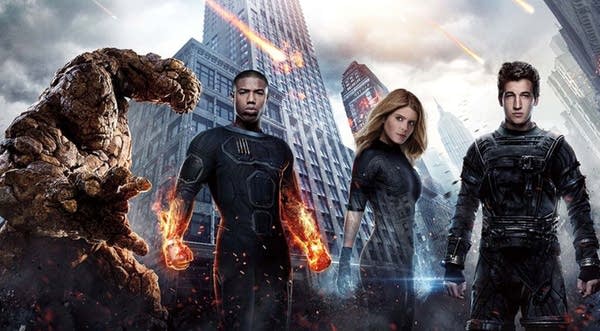Earlier this year I tracked the musical development of Marvel's Cinematic Universe up to Avengers: Age of Ultron. Recent release Ant-Man rounded out Phase II, and next year Phase III will start with the release of Captain America: Civil War. However, when it comes to Marvel comic adaptations, the Cinematic Universe is not the only game 20th Century Fox and Marvel are playing.
The X-Men series continues to thrive outside of the gravity pull of the Cinematic Universe, and Spiderman was only recently pulled in. Today brings a new take on The Fantastic Four, the third attempt so far. This go at starting a franchise is directed by Josh Trank of Chronicle fame and with it also comes a unique and unexpected collaboration to develop the original score.
Marco Beltrami, famous for the Scream franchise and frequent collaborator of Guillermo del Toro, has teamed up with famed composer Philip Glass to bring us something undeniably unique to their talents and compositional considerations. If you are familiar with either composer's work you will know that there are distinct differences between their styles—yet they are not so dissimilar as to question how they bridge the gap. With Trank citing David Cronenberg as a reference for the film's visual look it's clear he is trying to make great strides with what has now become worn material.
Beltrami definitely has plenty of experience with the genre. His credit list includes endless forays into comic book and action cinema with titles like Hellboy, Blade II, 3:10 to Yuma, and The Wolverine. Where he has shined as composer is in his ability to balance large-scale set pieces with an undercurrent of subtlety and humanity. Often resting heavily on percussion with brass and strings balancing it out, he is also a long-time collaborator of Buck Sanders, and together the two have learned how to experiment heavily with traditional instruments and noise composition to create textures and ambient aesthetics unlike anyone else in Hollywood. (I wrote more extensively about Beltrami in Anobium.)
Where Glass seems to enter into this equation is with arrangements that counter whatever is happening when they are introduced—like a bumper car hitting up against Beltrami's orchestrations. This sounds like a Beltrami score predominantly, but there are certain pieces, such as the prelude track and "He's Awake," where Glass's signature style is clearly evident. The fact that Glass's choppy rhythms and slow crescendos fit this musical landscape so well is evidence of what a profound influence minimalism has had on film music in recent decades.
The score is quite beautiful, as well as action-driven and propulsive. We'll see if the film is able to rise to the success of so many other Marvel films. Leading up to release it's battling bad press, and for whatever reason this has proven a tough franchise to sell to latter-day audiences. However, without its creation we would never have had opportunity to hear Philip Glass and Marco Beltrami collaborate on a big-budget comic book film, and that would have been a shame.
Garrett Tiedemann is a writer, filmmaker and composer who owns the multimedia lab CyNar Pictures and its record label American Residue Records.
Love the music?
Show your support by making a gift to YourClassical.
Each day, we’re here for you with thoughtful streams that set the tone for your day – not to mention the stories and programs that inspire you to new discovery and help you explore the music you love.
YourClassical is available for free, because we are listener-supported public media. Take a moment to make your gift today.

